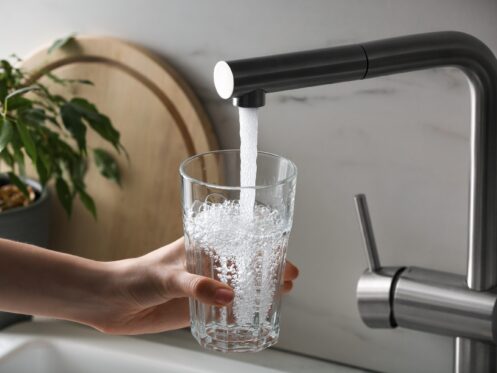Clean water in the home is often taken for granted. However, we always expect it to be there when we turn on our faucets or fixtures to cook, bathe, launder clothes, etc. As a homeowner, there are many different water filtration systems to maintain to keep up with a healthy and safe household. Your plumbing system and your water quality are included. Let’s look at some tips for maintaining clean water in your home.
The Importance of Clean Water
Water in your home can be contaminated in several ways. Sometimes this contamination occurs outside the home, while at other times, it occurs within the plumbing system of your residence. Cracked pipes can allow different contaminants to enter the water that is running through them. High concentrations of mineral deposits can affect water quality. So can sediment, chemicals, etc. In large-scale scenarios, there may be work in progress on your local water lines, which could also cause an issue with water quality.
If you consume contaminated water, it can make you feel unwell. Consuming certain contaminants for a long period of time can lead to gastrointestinal issues, inflammation, etc. These include bacteria, pathogens, viruses, lead, fluoride, chlorine, copper, radon, forever chemicals (or PFAs), and more. It’s imperative that we ensure the water in our home is as healthy and safe as possible. Not only do we drink water, but it’s absorbed into our bodies through our skin when we do something as simple as wash our hands or shower. We can also breathe steam into our bodies through our lungs, causing respiratory irritation and other problems.
Testing Your Home’s Water Quality
To give you an idea of the quality of water that you have in your home, you can have a water quality test performed. A professional can examine your water for you. They will typically check the water from different faucets and fixtures in your residence to get a well-rounded look at what your home’s water quality is like. There is the potential for a problem to occur in just one area of the home because of pipe damage, but this wouldn’t affect all the water in your residence.
Water Quality Improvements
Depending on what issues you find with the quality of your water, there are different improvements that you can make to address the problem. What you select will also be impacted by your budget.
Boiling Your Water
If you have been notified by your local water authority that there will be work done in the area, you may be under a boil-water advisory. This means that for approximately 24 to 48 hours you should boil any of the water that you are using for cooking or consumption. The process of boiling the water will kill any bacteria or pathogens that are in it. Water companies generally try to keep this from occurring, but situations like a water main break can’t always be avoided. You should be able to go back to normal use of your water once the recommended time has expired.
Take advantage of our amazing savings! Explore our specials and discover the best deals on plumbing services today!
Drinking Water Filtration
If the quality of your water isn’t considered to be that bad but you would like to improve the quality of the water you drink, a drinking water filtration system is ideal. There are different types of systems to choose from. A popular option is a reverse osmosis system, or RO for short. This involves water passing through a semi-permeable membrane where contaminants will be trapped. By applying pressure to the water, ions and molecules will be removed. Other filters may be present in an RO system, including a pre-sediment filter or an activated carbon filter. A storage tank is usually part of a reverse osmosis system, so you’ll need a bit of room for the installation. These systems work very well to improve the overall taste of your water.
An alternative is dedicated filtration without a tank. This type of system can usually be installed right under your kitchen sink or nearby. It delivers clean and healthy drinking water through a dedicated faucet. This is an on-demand system that filters water as you need it.
Whole-House Filtration
If you are concerned with all the water in your home, you can have a whole-house filtration system installed. This equipment features multiple stages of filtration that will remove things like chemicals and sediment from the water coming into your residence.
There are also multi-stage drinking water filtration systems that include two or more filters that remove sediments, minerals, chemicals, etc. The specific contaminants that are removed are determined by the type of filters that a system uses.
For a water filtration system to work properly, you’ll need to ensure that you are changing the filters as often as recommended by the manufacturer of your system. Not all the filters will necessarily be changed at the same time. Some are designed to last about six months, while others last as long as 12 months. Most systems will engage a light or alarm to indicate that it’s time to change your filters.
Water Heater Service
The water heater in your home should be inspected and serviced approximately once per year. This process will involve the water being drained from the tank. Any sediment or mineral deposits that have accumulated will be removed. Certain components will be inspected, such as electrical connections, the sacrificial anode rod, the tank itself, etc. It’s best to leave this for a professional to take care of. This will ensure that everything is performed properly and that you are safe throughout the process.
Annual Plumbing Inspection
Schedule an annual plumbing inspection once per year. Someone from our team will look at the various aspects of your plumbing system to confirm that everything is intact, structurally sound, and safe. If we notice that there are any issues, we can make repairs as needed. It’s important that we handle problems as soon as they are detected. This will prevent extensive damage from occurring that could greatly compromise the safety of your family’s water.
Replace Outdated Plumbing
If you live in an older home, have someone from our team inspect your plumbing system to see if there are outdated portions that should be replaced. These old pipes are very prone to leaks, corrosion, breaks, etc. The materials used for older pipes may cause water safety concerns as well. You could have lead in your pipes that has the potential to make you and your family sick. Homes built before 1965 may need pipe replacement.
If you would like assistance with the plumbing system in your Mesa home, reach out to our team here at Delta Mechanical. We can address any concerns that you have as well as install different types of water softeners and filtration devices. We also repair and install pipes, unclog drains, work on sump pumps, and handle hot water heaters. We serve various areas in Arizona, California, Florida, Texas, Colorado, and Nevada.
Contact us at Delta Mechanical today to schedule an appointment in or near Mesa or inquire about one of our other service areas.


